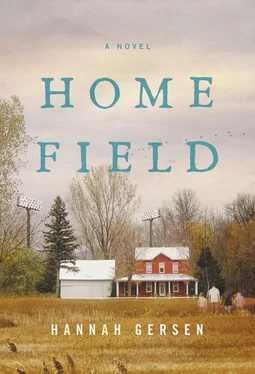A bell on the toy store’s door jangled when Robbie entered, and a man in a sweater vest came out from a storeroom in the back. He waved to Robbie and then took a seat behind the cash register. Robbie made his way through the little shop, starting with the cascade of stuffed animals in the front, which spilled over into the window display, past the games and sports-related gear, past the dolls, past the Legos, past the drawers of plastic animals, rubber balls, erasers, stickers, and other doodads, and into the small room in the back that was devoted completely to books. Robbie was starting to feel too old for toys. It was as if he’d lost an appetite. Just last Christmas he had spent an hour circling Lego sets in the JCPenney catalog, but he couldn’t imagine doing that again this year. He would rather circle items of clothing or books or video games.
The old-fashioned books his mother liked were in a special section called “Collector’s Editions.” Robbie already had several of them: Charlotte’s Web, Stuart Little, Grimm’s Fairy Tales, and The Sword in the Stone . Most of the other titles sounded too girly to him.
“Need any help?”
Robbie was startled by the voice behind him. He turned and there was the owner, watching him.
“No,” Robbie said. He quickly took a book off the shelf, Black Beauty . “This is the one I wanted.”
“Can’t go wrong with a classic.” The man smiled. “You look so familiar. Did you used to come here with your mother?”
Robbie nodded uncertainly. He didn’t know what to say. He was so stupid to have come in here. He couldn’t get caught now.
“I thought so! Where’s your mother today?”
“She’s shopping,” Robbie said. “She told me I could come here while she shopped. This is actually a present for her. For her birthday. It’s her favorite book.”
“How nice of you! Would you like me to wrap it up?”
“Yes, please.”
Robbie followed him to the register, where he stood awkwardly, fingering the bills in his pocket, praying the book wouldn’t cost more than fifteen dollars, which was all he had left. If he didn’t have enough money, the man would be annoyed. He might even charge for the wasted wrapping paper. It was fancy paper, a glossy blue with a gold, ribbonlike pattern. Robbie couldn’t help thinking that his mother would have appreciated it. She always noticed if something was nicely wrapped.
“Twelve ninety-five,” the man said when he was finished. He placed the book in a red paper bag with the store’s logo on it.
Robbie handed him his money, feeling relieved even though he now had only two dollars left for bus snacks. He hurried out of the shop after promising the man that he would say hello to his mother and then cut through an alley to get back to the station. As he walked, he realized it was getting very close to the departure time, so he headed straight to the depot to look for his bus. He found it and boarded. He was worried the driver would not take his ticket, because he was so young, but the driver only examined the ticket, checking for the correct date and time. Maybe I’m more grown-up than I realized, Robbie thought as he headed toward the back of the bus. He’d just had two exchanges in the adult world and no one had questioned him, no one had told him to be careful.
As the bus pulled out of the depot and onto the street, Robbie noticed two police cars parked outside the station. He wondered if someone had committed a crime while he was in the toy store. The idea frightened him, but in a thrilling way that made him feel like he was really, truly in the adult world.
The bus drove through the poorer neighborhoods as it made its way out of Hagerstown. Bedraggled-looking row houses were tucked right up against the sidewalks. There was a church without a steeple or a cemetery or even a proper yard, only a large cross hanging above a regular-sized door in a plain, square building. As they drove farther out of town, the buildings were more and more degraded until suddenly they weren’t; it was as if they’d passed over some invisible border and now the houses were new or semi-new or, at the very least, old with a new addition tacked on. These houses led to rolling suburbs with new construction, the houses all perfectly centered on their plots. Many of them had aboveground pools in their backyards, covered over with black tarps for the winter. Robbie began to doze off as they passed the views he liked best: the wide, open fields and split-rail fences that reminded him of his grandfather’s farm.
GENEVA BROUGHT OVER dinner around six, knocking on the side porch door. “Joelle sent me,” she said. “She said she’s sorry she couldn’t come over herself.”
“I’ll bet,” Dean said, letting her inside. “Did she tell you what happened?”
“I got the gist.” Geneva began to unpack everything she’d brought: green peppers, pepperoni, shredded cheese, tomato sauce, and a large premade pizza crust.
“Has there been any news?” she asked. “Any word from the police?”
“Nothing. Nada. Zilch.”
“Don’t lose hope, Dean,” she said. “They’re going to find him.”
“They’ve fucked up two perfectly good leads,” he said. “Excuse my language.”
“No excuse needed.”
“Someone calls from the bus station, says he’s sitting right there, and then suddenly he’s not sitting there? Where did he go?”
“Maybe he got on a bus.”
“That’s what I’m worried about. He could be halfway to D.C. or Baltimore by now. What the hell is he going to do there?”
“Take it easy.” Geneva rubbed his shoulder. “You can’t start panicking now.”
Dean sat down at the kitchen table. “It drives me crazy that he’s out there and no one can find him. What do they do when someone breaks out of prison?”
“Robbie’s smarter than a criminal,” Geneva said. “Here, help me with this pizza. It’s a Boboli, I had a coupon.”
Dean obeyed, finding a cookie sheet for the crust and heating up the oven. He wasn’t hungry, but he recognized that food was something they could do. He spread the tomato sauce on the cold crust and then he called Bryan into the kitchen to distribute the pepperoni, because he knew Bryan would enjoy the task. And Bryan’s presence would also force him to be optimistic.
“Stephanie fell asleep on the sofa,” Bryan reported.
“Good, she hardly slept at all last night.”
The three of them made the little pizza, assembling it quickly and putting it in the oven. Stephanie came into the kitchen while it was cooking. She seemed annoyed that she had been allowed to nap. She was obviously still tired; she had wrinkles around her eyes, the kind that emerge temporarily on the sleep-deprived. Dean got a glimpse of what she would look like when she was older, and for the first time, he could picture her in the world, the adult world, the one he sometimes felt he’d never lived in because he’d always worked in schools.
The pizza was tasty and Dean ate more than he thought he would. At the end of the meal the phone rang and Dean jumped to get it. But it wasn’t the police. It was See-See.
“Hi, Coach. I’m sorry to bother you. I know you’re dealing with a lot.”
“It’s okay, I was actually going to call you. Is everything okay?”
“I’m just wondering about tomorrow. We’re still competing, right?”
“Of course. I’m sending over a teacher from the middle school to help out — Ms. Lanning.”
“I know Ms. Lanning. I had her for English last year.”
“Okay, good, good.”
There was a silence, and Dean realized he had to say something coachlike. He felt depleted of advice, of the kind of optimistic and borderline-delusional things a coach had to say to get an athlete ready for a big event. And he felt self-conscious because his family was listening.
Читать дальше












